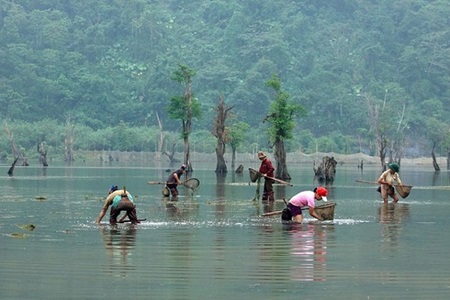|

"Greeting the dawn at Noong Lake was wonderful. The dew tinged with golden lights spread across the surface of the lake. Birds were singing melodiously. I had made the right decision to come here to escape the chaos of the city. My sorrows seemed to disappear," Hanoian Dung said.
"The smoke from the cooking taking place in houses on stilts mixed with the clouds and the mountain, making it a beautiful view," he said.
Thirty-year-old Dung decided to hire a raft to discover the lake, which is famous for the trees that float in it, early in the morning.
Dung said he was lucky to visit the lake on a sunny day, although it was the rainy season (April to October). The lake's water surface covers 80ha, but in the dry season, its area is just about 20ha.
"The size of Noong Lake's water surface changes every season. Moreover, it is surrounded by more than 700ha of mountains and primitive forests. So the lake has an interesting, though neglected, scenery," Dung said.
"It is a unique lake with trees growing in it. Some trees are dead, but others still grow in the middle of the lake," he said.
Noong Lake is a freshwater lake, spread across Noong 1 and Noong 2 mountain villages. It is fed by the groundwater from two mountains where the lake bends and the waters of the River Lo in the rainy season.
The lake has several kinds of fish such as carp, pimelode, catfish and bitterfish and has abundant flora and fauna, ranging from the plants and animals living in the water and beneath it, to the crops and livestock of the local people living near the lake, contributing to its diversity.
Local resident Vi Thi Loan of the Tay ethnic group said no one knew when the lake had been formed.
"The lives of more than 80 households in Noong 1 village is dependent on the lake, which gives them shrimp, fish and water for the fields," she said.
Loan said she had nearly 100 ducks in the lake and didn't have to feed them daily.
Pha Van Tien of the Tay community said Noong Lake had never been dry. It is 2m deep in the dry season and 10m deep in the rainy season. Tourists can visit the lake on rafts in all seasons. When the water is low, local people split the lake into areas to raise poultry.
Via the trip, Dung not only enjoyed the wild and romantic natural beauty at the lake, but also learned about the customs, culture and daily life of six ethnic groups here, including the Tay, Mong and Dao.
He also enjoyed unique cuisines made of bitterfish, chicken, duck and mutton, besides the home-grown vegetables of the local people.
In addition, Dung visited two famous pagodas in Vi Xuyen District where numerous relics of the Tran dynasty have been discovered.
The Sung Khanh pagoda was built in 1356 under the Tran dynasty in Dao Duc Commune. Its headstone has been recognised as a national treasure. The headstone is placed on a stone turtle and inscribed with unique patterns.
Another pagoda, Binh Lam, is located in Phu Linh Commune. Its bell was made in 1295. It has many ancient tiled roofs and statues.
The pagodas draw many tourists, thanks to their unique architecture and solemn atmosphere.
|